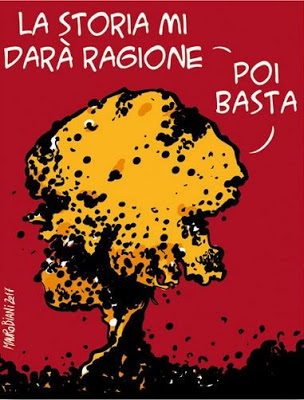‘The atomic bomb is immoral and criminal’: bipartisan silence greets in Italy the pope’s comment
 |
| Manlio Dinucci 28/11/2019 |
Institutional Italy is silent, but in Ghedi and Aviano Air Bases 70 U.S. nuclear bombs are stored. And new ones are about to arrive.
Italy’s politicians and corporate media, usually eloquent about any news concerning the Pope, greeted with the silence of the tomb the words pronounced by Francis on Nov. 24 in Hiroshima and Nagasaki: “The use of atomic energy for war purposes is, today more than ever, a crime. The possession of atomic weapons is immoral.”
These words are embarrassing for the leaders of Italy’s institutions. Like the ones who preceeded them, these leaders are responsible for the fact that Italy, a non-nuclear country in words, is in reality a country that houses and is prepared to use U.S. atomic weapons. This reality is in violation of the Non-Proliferation Treaty to which Italy has formally committed, and which prohibits militarily non-nuclear states from receiving nuclear weapons and from having direct or indirect control over them.
This is an even more serious violation because Italy, as a NATO member, has refused to adhere to the Treaty on the Prohibition of Nuclear Weapons voted by a large majority by the General Assembly of the UN. This treaty commits the signatory States to neither produce nor possess nuclear weapons, to neither use nor threaten to use them, nor to transfer or receive them directly or indirectly; the objective of these rules is the total elimination of nuclear weapons.
What is embarrassing for Italy’s rulers is the question that Pope Francis asked in Hiroshima: “How can we speak of peace while we build new and formidable weapons of war?” In Italy there are currently about 70 nuclear bombs, all of the B61 model, but the new and deadlier U.S. nuclear bombs B61-12 (a number not yet widely known) are about to be deployed on Italian territory in place of the current B-61.
The B61-12 has a nuclear warhead with four selectable power options. When launched, the operators can choose the power of the explosion according to the target to be hit. Unlike the B61, released vertically upon the target, the B61-12 is launched remotely and guided by a satellite system. It also has the ability to penetrate the subsoil, even through reinforced concrete, exploding deep underground to destroy the bunkers of command centers and underground structures, so as to “decapitate” the enemy country in a first nuclear strike.
More embarrassing is the pope’s other question: “How can we propose peace if we continually use nuclear war threats as a legitimate means of conflict resolution?”
Italy, as a member of NATO, endorsed Trump’s decision to cancel the INF Treaty, signed in 1987 by Presidents Mikhail Gorbachev and Ronald Reagan, which had made it possible to eliminate all the intermediate range ground-based nuclear missiles deployed in Europe, including those installed in Comiso [Sicily, Italy].
The U.S. developed new ground-based intermediate range nuclear missiles, both cruise and ballistic (these are capable of hitting targets within minutes of launch), to be deployed against Russia in Europe, certainly placed also in Italy, and in Asia against China. Russia has warned that, if these weapons are deployed in Europe, it will aim its nuclear missiles at the territories where they are installed.
Nuclear powers possess a total of about 15,000 nuclear warheads. More than 90 percent of the nuclear warheads belong to the United States and Russia. Each of these two countries has about 7,000 such weapons.
The other countries in possession of nuclear warheads are France (300), China (270), Great Britain (215), Pakistan (120-130), India (110-120), Israel (80), North Korea (10-20). Five additional countries − Italy, Germany, Belgium, the Netherlands and Turkey − together have about 150 U.S. nuclear warheads deployed on their territory.
However, the arms race again underway is taking place not so much in terms of quantity as in terms of quality, i.e., finding effective launch platforms and increasing the offensive capabilities of the nuclear warheads.
And when Pope Francis affirms that the use of nuclear energy for war purposes is “a crime not only against humanity and its dignity, but against every possibility of future in our common home,” he is saying that nuclear war endangers the future of the Earth. That’s why those engaged in the defense of the environment should speak up, because the most serious threat to the living environment on the planet is nuclear war. Thus their priority should be the complete elimination of atomic bombs.
Will the warning of Pope Francis now be heard in the Church and among Catholics − those who in Japan are in the front line against any rearmament and reform of the Peace Constitution?


